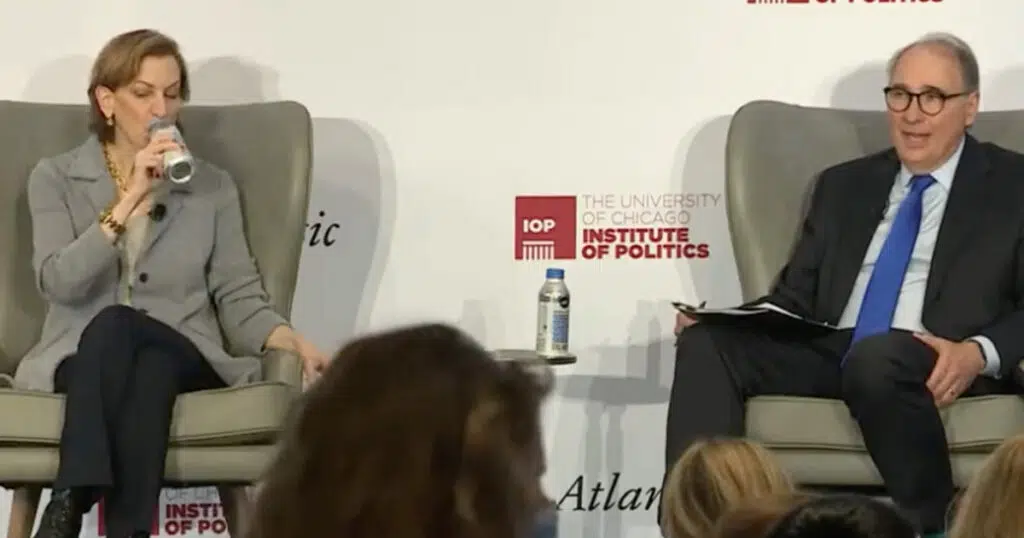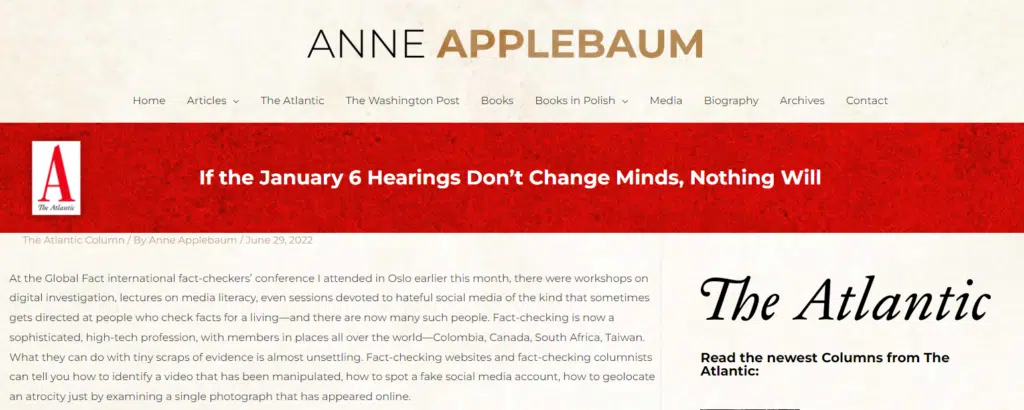
Bias And Idiocy At The Atlantic
On April 6 at the University of Chicago, former Obama political guru David Axelrod held an event entitled “Disinformation and the Erosion of Democracy” featuring a number of legacy media figures opining, essentially, on the loss of their stranglehold on the national narrative.
The conference went about as well as the legacy media’s performance has gone in recent years in maintaining their credibility and respect from the American people.
Several very inconvenient questions were asked during the conference which all but stumped the legacy media figures appearing in comfy chairs at the dais. One came courtesy of a University of Chicago student named Daniel Schmitt during an appearance by The Atlantic’s Anne Applebaum. Schmitt asked whether the mainstream media’s suppression of the Hunter Biden laptop computer revelations in the fall of 2020 didn’t qualify as the kind of “disinformation” the conference was purportedly called to combat.
Schmitt’s question was perfectly worded. “So, in 2020, you wrote ‘those outside the Fox News bubble do not, of course, need to learn any of the stuff about Hunter Biden,’ referring to his laptop, of course,” he began. “A poll later found out that if voters knew about the contents of the laptop, 16% of Joe Biden voters would’ve acted differently. Of course, we know a few weeks ago The New York Times confirmed that the content is real.”
“Do you think the media acted inappropriately when they instantly dismissed Hunter Biden’s laptop as Russia disinformation and what can we learn from that in ensuring that what we label as disinformation is truly disinformation and not reality?”
And Applebaum’s answer was nothing short of bizarre, particularly given the setup and the question – which established that the suppression of the Hunter Biden laptop story had a material effect on the 2020 election. Not least, of course, the subsequent revelations in the story, including the most recent ones proving that Hunter and Joe Biden were in constant communication in relation to the former’s dealings with sleazy foreign spies and other actors.
“My problem with Hunter Biden’s laptop I think is totally irrelevant,” she said. “I mean it’s not whether it’s disinformation or, I mean, I didn’t think the Hunter Biden’s business relationships have anything to do with who should be president of the United States, so I don’t find it to be interesting, that would be my problem with that as a main news story.”
That’s what Anne Applebaum of The Atlantic said about revelations that the son of the ultimately-elected president was busily engaging in influence-peddling deals, for which millions of dollars ultimately made their way into that president’s pockets, with connected Ukrainian, Russian and Chinese bigwigs.
It’s simply not a big deal.
That was Anne Applebaum in April, and she was roundly, and deservedly, ridiculed for it.
But this is Anne Applebaum in June…

It’s comical enough to read the headline. The piece itself is riotous.
In modern America, the best example of this phenomenon is the 35 percent of surveyed Americans—one third of the country, and two thirds of the Republican Party—who aren’t sure who won the 2020 election. As the pollster and analyst Sarah Longwell has explained, their doubts come not from their misunderstanding of specific vote counts, but from the context that they live in. Surrounded by social-media influencers and authority figures who have repeatedly attacked the veracity of the electoral process since 2016, they have come to treat with suspicion anyone who points out the absurdity of the many electoral conspiracy theories out there (Hugo Chavez manipulated the voting machines years after his death; Italian defense contractors altered the result via the internet). They simply feel doubt. Not only do facts and fact-checkers not change doubters’ minds, they harden their views. As a woman from Arizona told Longwell, “I think what convinced me more that the election was fixed was how vehemently they have said it wasn’t.”
But if facts alone won’t make anyone reconsider their view of January 6, a deeper, more thoughtful, more nuanced effort to tell the story might—at least in theory. Rauch, Longwell, and the large community of fact-checkers who think about reaching that skeptical 35 percent have often argued that shouting about the objective truth will never work and that what is needed instead is the construction of trust. The designers of the January 6 committee’s hearings have taken that argument to heart. In essence, they have created a giant fact-checking project designed not only to write an accurate account of what happened in the run-up to the Capitol attack, but to convince people to believe it. The point is not to establish whether some detail that one witness reveals is true or false, but rather to tell a larger story, using a wide range of perspectives, delivered in a manner optimally designed to create trust.
Towards that end, the hearings offer not just a single point or argument that can be disputed, but instead seek to embed all of the different facts into a coherent narrative. This is an evolving story, a puzzle being put together using a range of different pieces. The story begins not just when Trump lost the election, but when people whom he knew well—his daughter Ivanka, his adviser Jared Kushner, and Attorney General Bill Barr being the most notable—told him that he had lost. Having established that truth, the committee went on to show how, despite having been told that he had lost, Trump sought to steal the election anyway. Each phase leads to the next, and all of them are bound together by a single narrator: Representative Liz Cheney, the committee’s Republican vice chair, provides a single, authoritative voice that unifies the different parts of the story.
Applebaum goes on to laud the testimony of Cassidy Hutchinson, the 25-year-old White House staffer who was summoned to provide hearsay testimony which was utterly bizarre and easily debunked – Hutchinson’s third-hand story to the effect that President Trump lunged for the steering wheel of his presidential SUV in order to direct it to the Capitol on January 6, 2021 was immediately disputed by Secret Service agents who were in the vehicle, and a note she claimed to have personally written was immediately disputed by the more senior White House staffer who actually wrote it.
This, a little more than two months after getting publicly embarrassed by a college student with a question she should have expected would come.
The cognitive dissonance here is really something to see. It’s emblematic of just how far gone most of the legacy media is now. They can’t fathom why the public doesn’t trust them anymore, and pleasure themselves with the idea that it’s mouth-breathing rubes from flyover country who just don’t get it.
The reason Applebaum’s 35 percent of Americans who don’t trust the 2020 election can’t be persuaded by her or the people she represents is that she can’t persuade anyone. It’s her credibility which is the problem, not their cognition.
Anne Applebaum might not like it, but a 2005 bipartisan commission on election integrity loudly warned against the use of mail-in balloting, noting the multiple significant deficiencies in that method with respect to things like chain of custody and susceptibility to fraud, among other things. And in all of the states where the 2020 presidential election was disputed there were departures from established norms – to include mail-in balloting – at the last minute using COVID-19 as an excuse.
Rather than agree these things should be properly investigated and concede that election integrity is a recognizable public good which is worth the trouble of vetting, she dismisses the concerns of the tens of millions of Americans who cry foul. Instead, we’re treated to a January 6 commission kangaroo court in which none of the legal customs – the presence of adverse parties, cross-examination of witnesses, impartiality of the trier of fact, and so on – have been observed.
And she believes a Soviet show trial will convince everyone who can be convinced?
This is not respectable journalism. This is rank hackery. Ordinary Americans can smell it a mile away, and it’s the reason the legacy media is at an all-time low in respect and credibility.
Shameless cognitive dissonance will only get you so far. And while The Atlantic is now a vanity publication funded by Apple founder Steve Jobs’ widow, a megadonor to the Joe Biden campaign, and therefore insulated from the punishment of the market, we don’t have to afford any undue respect to the ridiculous Anne Applebaum – or the even more ridiculous attempts of her friends in Congress to criminalize opposition to the conduct of the 2020 presidential election.



